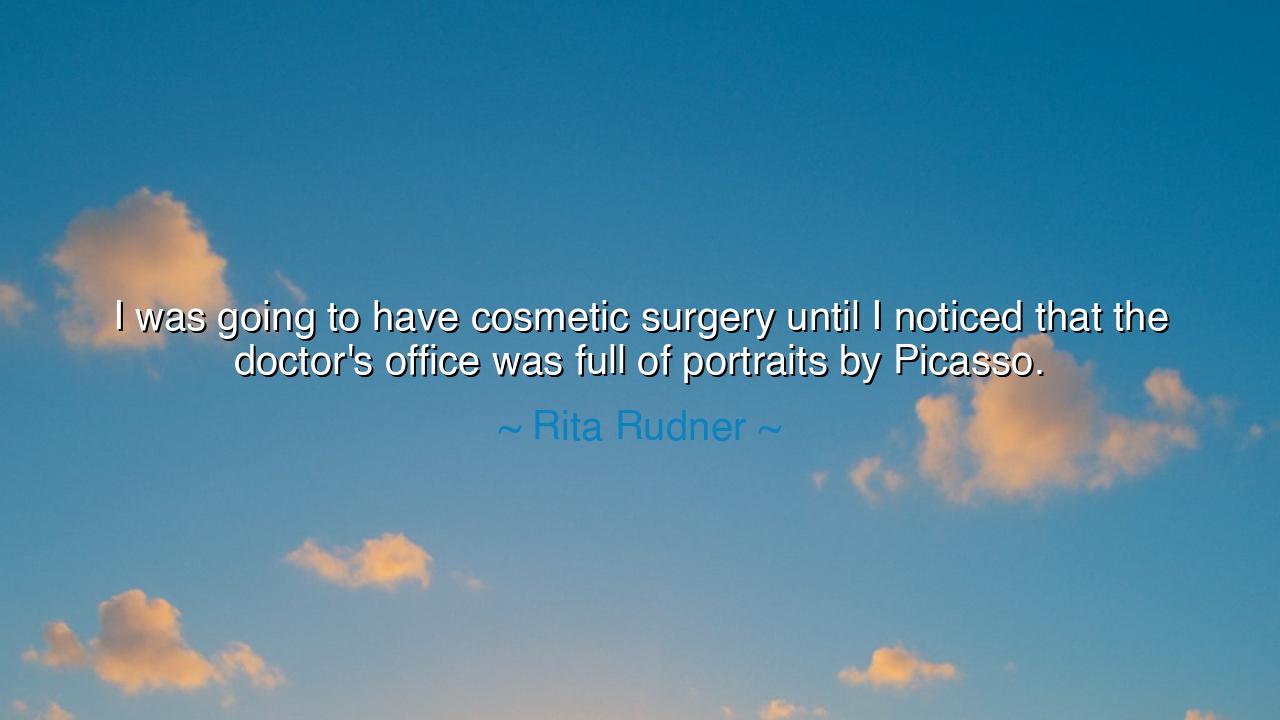
I was going to have cosmetic surgery until I noticed that the
I was going to have cosmetic surgery until I noticed that the doctor's office was full of portraits by Picasso.






Hear, O seekers of humor and wisdom, the voice of Rita Rudner, who with light jest declared: “I was going to have cosmetic surgery until I noticed that the doctor’s office was full of portraits by Picasso.” At first, the words seem but a joke, made to provoke laughter. Yet beneath the laughter lies a truth of great depth: that one must be careful whose vision of beauty they trust. For the hand that heals or reshapes the human face must be guided not only by skill but by a true understanding of harmony, dignity, and proportion. If the surgeon sees the world as distorted, so too may he shape the face that rests in his care.
The origin of this saying comes from Rudner’s gift of comedy, which cloaks wisdom in laughter. She wove daily anxieties—here the pursuit of beauty—into stories that revealed the absurdity of human desire. By invoking Picasso, the great artist whose works often bent faces into twisted forms and fragmented visions, she warned against entrusting one’s image to those who may not share one’s sense of balance or truth. For what is beauty if not harmony? And what is distortion if not beauty lost in exaggeration?
Consider, O listener, the tale of the Medici of Florence, who summoned artists to glorify their courts. Some sculptors, like Michelangelo, sought to reveal the divine hidden within marble, shaping David in perfect proportion. Others, less skilled or more eccentric, created forms that distorted the human body beyond recognition. Both were called “art,” yet one inspired awe while the other provoked confusion. So too with physicians: a doctor with the eye of Michelangelo restores dignity, while one with the eye of Picasso may carve a face that is striking but strange. Rudner’s jest, though playful, teaches us to discern carefully who shapes our image.
This truth also warns against the danger of chasing beauty without wisdom. Many in history, from emperors to actors, have sought to preserve youth through unnatural means. Recall Empress Elisabeth of Austria, famed for her beauty, who underwent punishing routines and dangerous treatments in her quest to stay young. Her body grew frail, her spirit weary, all for the sake of an image. In the end, her pursuit of perfection brought more sorrow than peace. Rudner, with her laughter, reminds us that to seek beauty in reckless hands—or distorted visions—is to risk losing the harmony of one’s natural form.
The quote also speaks to the larger struggle of humanity: to balance the pursuit of outward appearance with the preservation of inner dignity. It is not wrong to desire improvement, nor to adorn the body, but one must choose with wisdom. For if we entrust our bodies to those who see not wholeness but fragments, we may emerge as shadows of ourselves. The portraits on the wall reveal the mind of the maker; and so too does the surgeon’s art reveal his perception of beauty.
O children of tomorrow, learn this lesson well: choose wisely the guides and mentors who shape your life. Whether in medicine, in art, or in counsel, seek those who see you whole, not broken; who seek to reveal your best self, not remake you into their distorted vision. Let Rudner’s jest remind you that laughter often conceals truth: that those who shape you must be chosen with discernment.
Practically, this means questioning before you trust. Look not only at the skill of those who wield the scalpel, the brush, or the word, but at the vision they hold of humanity. If their art uplifts, entrust yourself; if their art distorts, guard your soul and body well. Seek harmony, not chaos; seek wisdom, not mere novelty.
Thus Rudner’s playful words endure beyond the stage: “I was going to have cosmetic surgery until I noticed that the doctor’s office was full of portraits by Picasso.” Let us laugh, but let us also heed the truth: that beauty is not in distortion, and that wisdom must guide us in choosing those who shape the vessels of our lives. For in the end, the face may fade, but dignity—once guarded—will remain eternal.






AAdministratorAdministrator
Welcome, honored guests. Please leave a comment, we will respond soon